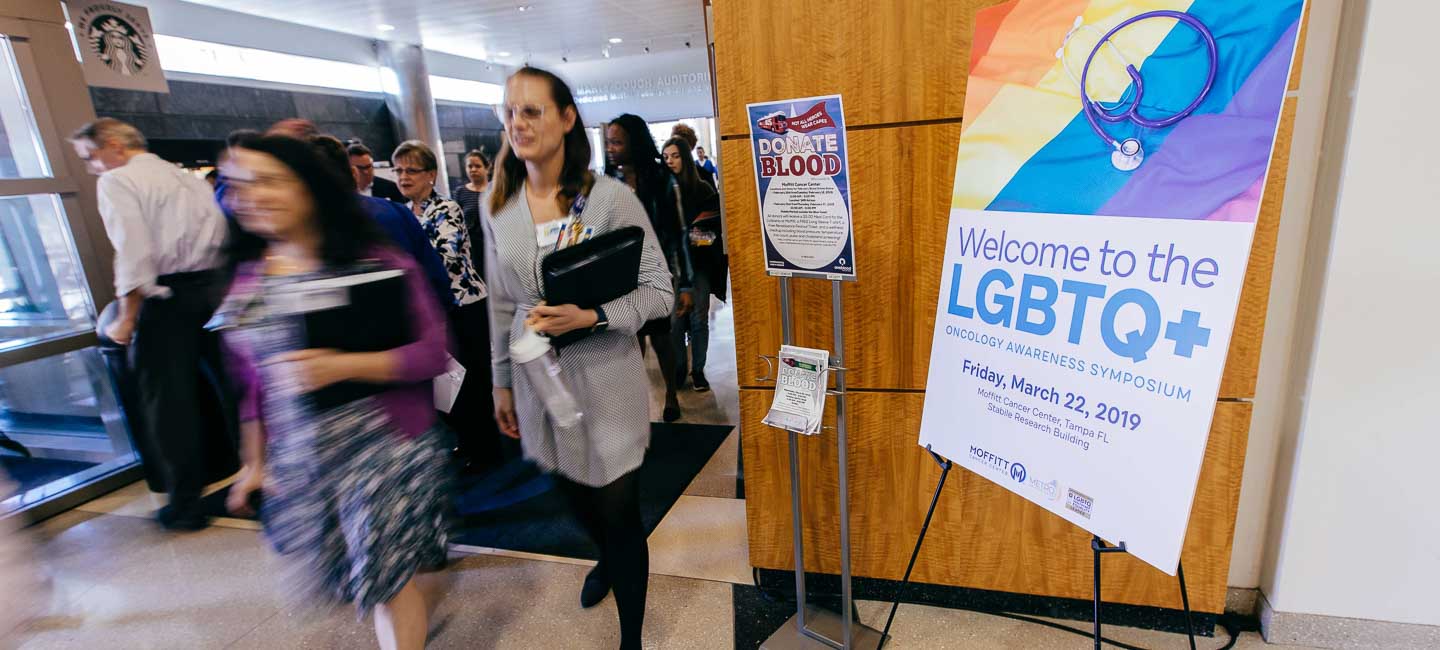Symposium Showcases Need for Better Communication Care for LGBTQ Patients
Oncologists and clinicians packed Moffitt Cancer Center’s Ted Couch Auditorium March 22 to learn about best practices for lesbian, gay, bisexual, transgender and queer/questioning (LGBTQ) people with cancer. Liz Margolies, executive director of the LGBT Cancer Network in New York City, kicked off the inaugural LGBTQ+ Oncology Awareness Symposium by directly addressing the disparities faced by this community.
“Living as LGBTQ people, we have increased cancer risks, lower screening rates and additional challenges in survivorship,” she said. “Right now there aren’t numbers about the community because none of the cancer registries ask about orientation or gender identity. The research that we do have available suggests that LGBTQ people have higher mortality rates.”
Margolies hopes that those who heard her speak understand the importance of generating data specific to the LGBTQ community. She pointed to studies on health disparities in the black/African-American community to provide context.
“Right now we don’t know the reasons for LGBTQ mortality rates,” she said. “Collecting that information is key. For example, in terms of race, we know that white women are more likely to be diagnosed with breast cancer while black women are more likely to die from it. That helps medical professionals develop standard protocols, which are hugely important. That should be the ultimate goal for the LGBTQ community as well.”
The LGBTQ community has long been a medically-underserved minority population in the United States. Disparities experienced by LGBTQ patients, especially in cancer care, can lead to poorer outcomes and overall health. The LGBTQ+ Oncology Awareness Symposium sought to combat those disparities head-on.
“Proper education can go a long way to help overcome disparities and better serve the LGBTQ+ community,” said Dr. Desiree Chachula, Moffitt’s Diversity and Inclusion manager. “This symposium highlighted a community that includes our neighbors and our friends.”
The afternoon-long symposium provided attendees with multiple chances to hear the LGBTQ perspective as it pertains to healthcare and cancer care. Lucas Wehle, manager of Metro Inclusive Health’s Transgender Services Division, discussed the specific challenges faced by transgender individuals when they find themselves in a medical situation.
“A doctor cannot be afraid to ask us questions,” Wehle said before his talk. “And we as patients cannot be afraid to offer those answers. Like any relationship, there has to be an even ‘give-and-take.’ A doctor can’t correctly diagnose me if I am not honest about being a transgender man who has had certain medical procedures during my transition. But transgender people are more likely to be less honest if their physician is not accommodating or accepting of the transgender community. There has to be a conversation.”
During a breakout session to discuss the primary care needs in cancer preventative health for LGBTQ people, former Moffitt patient Alex Howe talked about the importance of an inclusive environment, specifically in a doctor’s office.
“I am fortunate that I am a confident, out gay man,” Howe said. “But I know there are a lot of gay individuals who don’t feel so comfortable sharing the specifics of their lives, especially with a doctor. Knowing that you are in a safe place is the first step to getting the treatment you need to live. That’s why I’m so thankful I was at Moffitt as a patient. I never felt uncomfortable.”
The symposium came on the heels of a new national survey led by Moffitt cancer epidemiologist Dr. Matt Schabath to identify potential gaps in attitudes, knowledge and institutional practices for LGBTQ patients. In that survey, 8 percent of oncologists agreed that it is important to know the gender identity of their patients. Six percent of oncologists said it is important to know a patient’s sexual orientation and 4 percent of oncologists were interested in receiving education regarding the unique health needs of LGBTQ patients.
“Three to 12 percent of the U.S. adult population identifies as LGBTQ,” said Schabath. “Studies show the LGBTQ population has an increased risk and poorer outcomes for certain cancers, but despite that increased risk, they are less likely to go to the doctor for screenings. This group also reported lower satisfaction with cancer care. Our survey identified there is need and a desire among oncologists for education and training about LGBTQ patients.”
The LGBTQ+ Oncology Awareness symposium was a first for Moffitt, but it may not be the last. Organizers hope to bring the symposium back and to provide more educational opportunities for clinicians and oncologists as they interact with the LGBTQ+ community.
“The feedback has been very positive and the enthusiasm around the symposium has been very inspirational,” said Chachula. “If any of our attendees are able to define social determinants of health and unique barriers to care for this portion of our population and can take immediate tangible steps to narrow those gaps, then our event was a success.”



